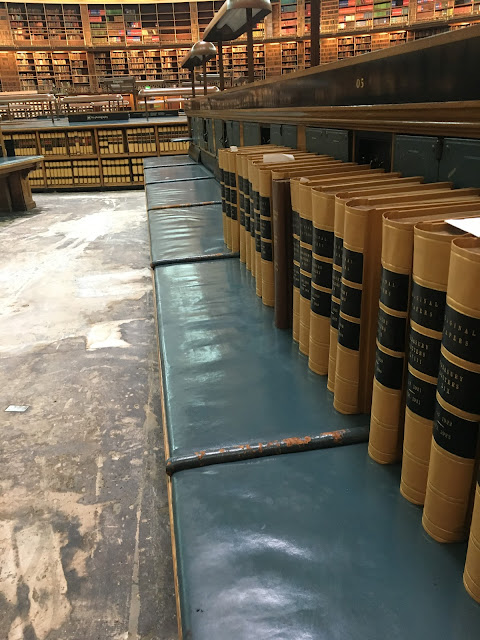Today, I spent the morning exploring the British Museum on my own. 700 million people a year visit and this is likely because it's free and has been kept free. I saw a lot of cool things, but the clear highlight was the Rosetta Stone!
 |
| One of my friends put it best: "Linguistics is really cool in small doses" |
The afternoon was a behind the scenes tour of their archives, which were not at all what I was expecting. The main lobby, or "courtyard" of the British Museum looks like this:
Which I thought was beautiful, so I took a picture. Little did I know that the Reading Room where we were going was inside the huge dome in the middle! And it was so breathtaking!
Like jaw hitting the floor, staring with wide eyes glazed over in bliss breathtaking.
 |
| What a ceiling! |
This room was not open to the public and hadn't been for years. The majority of the material in the space was records of the museum itself. The archivist who talked with us was on her own--the only archivist for the entire museum (and only the second qualified archivist they've ever had)! That isn't enough staff to run the space regularly, but to make matters worse, none of their material is cataloged because she just hasn't had time to do it on her own. The only reason she can do her job at all is because she has familiarized herself with the collection over her 12 years there, so she knows a lot about what things are where. The material in there isn't organized in any way (or it wasn't before the archivist got her hands on it!), and a lot of it was not uniform (but more on that later). They aren't currently an accredited archive--the National Archive gave them all the material about 25 years ago on the condition that it would be cataloged, which is still something they aren't able to do. I found it very, very sad--there are tons of treasures in the room that are literally degrading because there aren't enough staff and funding to do something about it. One archivist, no conservator, and nowhere to start. It's an example of exactly why we need information organization, and how we're dying despite that.
 |
| This is the bomb that hit the museum during the second world war |
 |
| This is the destruction it wrought! |
And finally, a few quirky finds that got a chuckle out of me.
 |
| Raise the roof y'all, we're kickin' this party off 2000s style. |
 |
| Stop feeding the cats, for god's sake!!!! |
Another adventure awaits tomorrow!








Okay... Serious comment for the first time.... I think this brings up a great question about what types of ephemera should be classified as "archives" and given the honor of saving. Do you think that EVERY SINGLE thing from the lives of Charles Darwin, Dickens, etc. should be saved? Do we really need to keep that grocery list? What is the criteria that defines the item's importance?
ReplyDeleteI think that really depends. This archives is saving what is relevant to them--important figures (of course, that term is subjective) who visited their library and signed into the visitor log. It matters for the history of their organization, so it's important to them, and I understand why they specifically have decided to keep it.
DeleteAs well, I don't think we have any way of knowing when something will be important or valuable. Maybe in 100 years we find out something new about Charles Darwin and we'll wish we kept that grocery list because it's a piece of the puzzle we didn't know existed.
In the end though, it all goes back to limitations. The archive will keep what they can afford to keep and have space for. When they run out of space or budget, they will then evaluate what they can get rid of (or move to another storage location). It's like what we do in our public library when we weed, inherently we are adding a personal judgment just by deciding to keep or not keep an item. You might make a different call than I, but it all depends on who is in charge and actually gets to make that decision. This changes over time, and so will each item's importance.